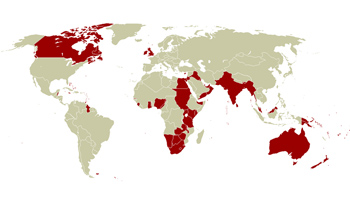The British Empire, at its height, was the largest empire in history, and its influence extended over a quarter of the world's land and population. From the 16th century through the 20th century, its global presence shaped international trade, politics, and culture. This extensive exploration into the British Empire will cover its early days, periods of significant expansion, the impact on colonized regions, and its eventual decline, providing insights into one of history's most powerful and influential empires.
Early Beginnings and Expansion
The roots of the British Empire can be traced back to the end of the 15th century with England's maritime explorations. The establishment of overseas colonies began in the early 17th century, with settlements in North America and the Caribbean. The 17th and 18th centuries saw further expansion into India and parts of Africa. The empire's growth was driven by trade, particularly in commodities like tea, cotton, and sugar, and later by the industrial revolution and the expansion of the British Navy, which allowed for greater control of sea routes and colonies.
Height of Power and Dominance
The 19th century marked the peak of the British Empire’s power, often termed the "Pax Britannica" period. It was characterized by relatively peaceful conditions, economic prosperity, and the rapid expansion of the empire, particularly in Africa and Asia. The British Empire controlled key strategic points across the globe, ensuring dominance in world trade and international politics. This period also saw the spread of the English language, British cultural practices, legal systems, and other aspects of British life across the colonies.
Economic Impact and the Industrial Revolution
The British Empire played a crucial role in the industrial revolution, both as a market for industrial goods and as a source of raw materials. The empire's vast network facilitated international trade and investment, contributing significantly to Britain's economic growth. However, this economic expansion often came at the expense of colonized countries, where resources were exploited and local industries were disrupted or suppressed to benefit British economic interests.
Cultural and Social Influence
The empire had a profound impact on global culture, from the spread of the English language to the integration of British customs and education systems in the colonies. This cultural exchange was not one-sided; the empire also facilitated the flow of ideas, cuisines, and traditions from the colonies back to Britain. However, this cultural integration often came with a cost, as it was intertwined with the imposition of British values and the suppression of indigenous cultures.
Resistance, Nationalism, and Decolonization
The 20th century witnessed the growth of resistance movements and rising nationalism in the colonies. World War I and II significantly weakened Britain's financial and military position, making it difficult to maintain control over its vast empire. The process of decolonization accelerated after World War II, with many colonies achieving independence. Key moments included India's independence in 1947 and the Suez Crisis of 1956, which marked the end of Britain's role as a superpower.
Legacy and Contemporary Reflections
The legacy of the British Empire is complex and still debated today. While it contributed to the development of a globalized world, it also left behind issues of post-colonialism, economic disparities, and cultural identity struggles. The empire's impact on the former colonies and Britain itself continues to influence international relations, political discourse, and cultural interactions in the contemporary world.
In conclusion, the British Empire's story is one of immense power, global influence, and eventual decline. Its history offers valuable insights into the dynamics of empire-building, colonization, and the enduring effects of imperialism on the modern world. Understanding this history is key to comprehending many of the global interactions and structures present in the 21st century.
